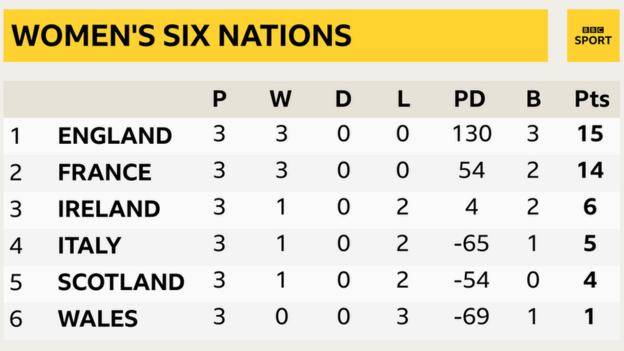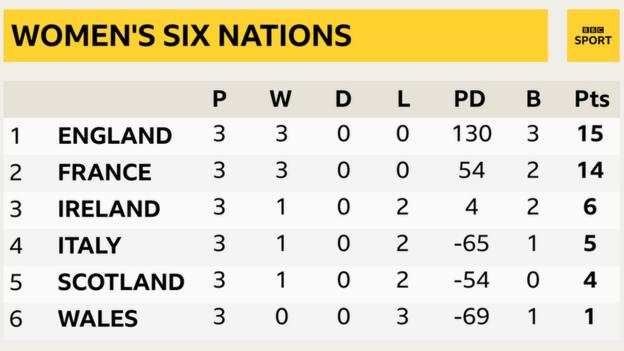| Venue: Twickenham Stadium Date: Saturday, 20 April Kick-off: 14:15 BST |
| Coverage: Watch live on BBC Two, BBC iPlayer and online; live commentary on BBC Radio 5 Sports Extra; text commentary, highlights and report on BBC Sport website and app. |
England have scored the most tries, made the most metres and conceded the fewest points in this year’s Women’s Six Nations.
John Mitchell’s side are topping all the required stats needed to secure a third successive Grand Slam and a sixth successive title.
But the Red Roses also lead the way in an area where they certainly do not want to be top of the charts.
Amy Cokayne’s red card against Scotland was England’s second in their three victories, with no other side having a player sent off.
But Mitchell believes his side are topping all the match-winning stats because they play on the edge.
Will this mean they cross the line occasionally? Yes. Is this a problem for Mitchell? No.
“We are certainly not going to go away from the edge as it is what drives us and is what the game is all about,” said Mitchell.
“I want us to continue to play on the edge, but also want us to be aware of how we need to change our behaviour.”
Bench impact can make the difference
On Saturday, England welcome Ireland to Twickenham in front of an expected crowd of more than 45,000.
The Red Roses were in ruthless mood in Edinburgh last week – even with a player down – and five of England’s eight tries came from the back three of Jess Breach, Abby Dow and Ellie Kildunne.
Unleashing their attacking talent remains Mitchell’s core philosophy and has resulted in full-back Kildunne scoring six tries this Six Nations. She also tops the stats for line breaks (seven) and metres made (342).
The team’s faster playing style requires extra levels of energy in both attack and defence, and the replacements will be pivotal as starters begin to tire.
The return of 109-cap Emily Scarratt on the bench for her first game since the opening victory over Italy could help the hosts maintain pressure on Ireland.
“I am looking for our bench to have more impact and continue the momentum, and I feel we possibly haven’t got that right in recent weeks,” Mitchell said.
“I know individually the girls are doing their best to impress, but when you are given that role it is about connections and having an impact as a group.”

Ireland the most ‘dominant’ tacklers
Since England turned professional in 2019, the gap between Ireland and the Red Roses has increased year on year.
In Cork last year, Ireland – under then head coach Greg McWilliams – frustrated England for large portions of the game before succumbing to a 48-0 defeat. They failed to win any of their five games and finished rock-bottom of the standings.
Former England assistant coach Scott Bemand was appointed as the new Ireland coach in July and the impact has been instant.
Ireland impressed in defeat away to France in the opening game of the tournament before their impressive victory over Wales last weekend.
Bemand’s side have scored 10 tries across their three games, with only France and England scoring more.
“Scott has gone in and given direction and organisation on both sides of the ball,” said England defence coach Sarah Hunter, who played under Bermand as a player.
“Ireland certainly have been a lot more organised in attack and threatening, and have scored tries from all over.”
Despite defeats by Italy and France, Ireland have brought their own edge in defence with their fast line speed and big collisions.
“They are the most dominant team in the Six Nations with how they hit,” Hunter added.
Win collisions and you usually win games, so playing on the edge is a risk both sides may have to take.
Line-ups
England: Kildunne; Dow, Jones, Heard, Breach; Aitchison, Hunt; Botterman, Atkin-Davies, Muir, Aldcroft, Galligan, Kabeya, Packer (capt), Matthews.
Replacements: Powell, Carson, Clifford, Talling, Feaunati, L Packer, Scarratt, Gregson.
Ireland: Delany; Corrigan, Higgins, Dalton, Parsons; O’Brien, Reilly; Djougang, Jones, Haney; Wall, O’Connor, Wafer, McMahon, Hogan.
Replacements: Moloney, O’Dowd, McGrath, Tuite, Ikahihifo, Scuffil-McCabe, Breen, Deely.
Referee: Aurelie Groizeleau
